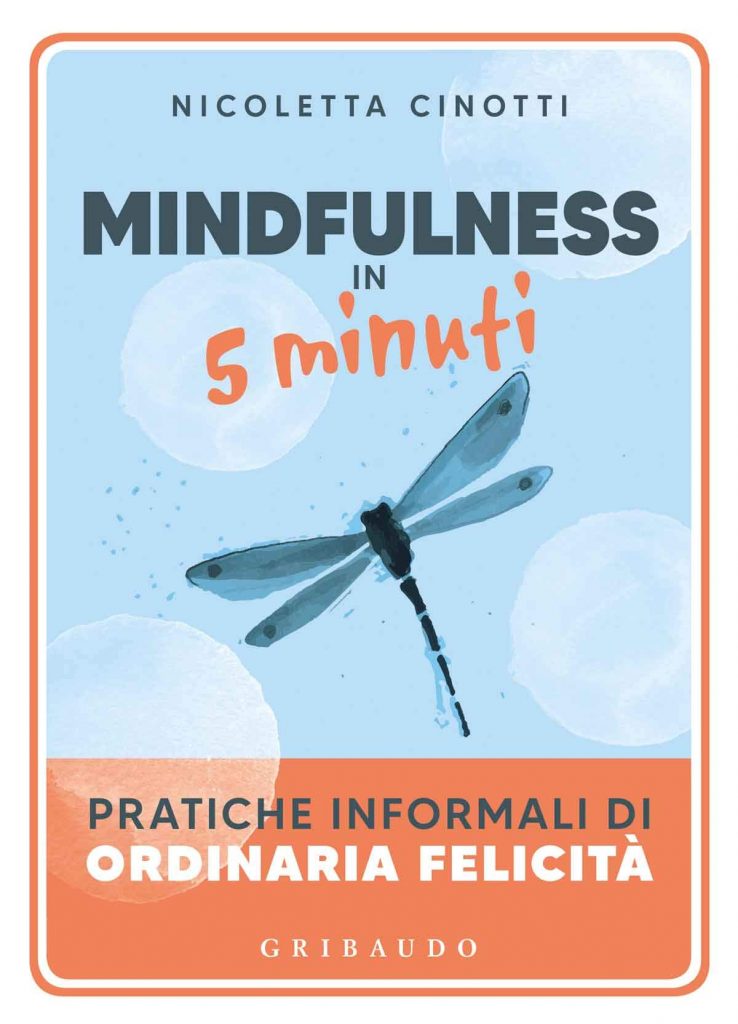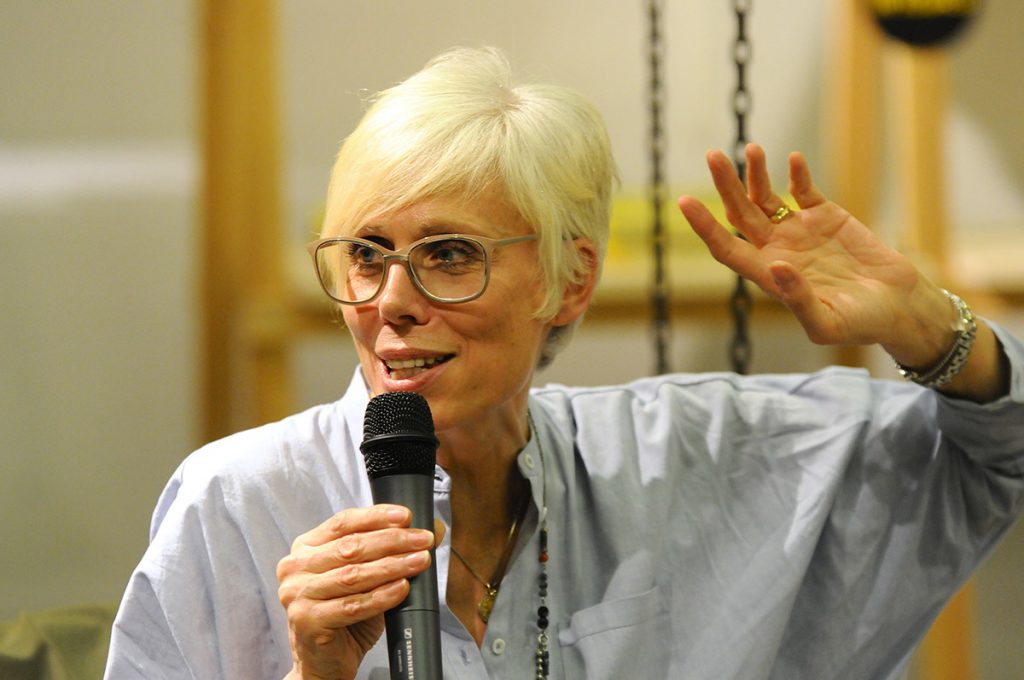The lockdown exposed us to turmoil and stress. Conditions in which it is not easy for the mind to recover strength and lucidity and find useful ideas to reinvent the future. Psychologists advise restoring energies through meditation. Even better to mindfulness, that is, that form of conscious meditation that focuses on breathing, body and the dimension of the here and now.
The new book by psychotherapist and bioenergetic analyst Nicoletta Cinotti, whose video tutorials have reached over 60,000 views on YouTube in just the months of lockdown, deals precisely with mindfulness.
Mindfulness in 5 minutes. Informal practices of happiness, Gribaudo Editore, guides the reader towards self-awareness (of his body, of his own breathing) to recover the introspective dimension that the stress of everyday life, especially these days, has fatally overshadowed.

The practical exercises contained in Mindfulness in 5 minutes aim to relieve disturbing phenomena, negativity, nervousness, insomnia. Nicoletta Cinotti clearly and very accessible describes relaxation and grounding practices. A writing for everyone. Tips mostly, which by its own admission are not the panacea for all the evils of the world but friendly suggestions, food for thought. To try, if possible to change our point of view, or simply broaden it.
In this exclusive interview she tells us how her passion for bioenergetics and mindfulness was born.

When was your passion for mindfulness born?
I have been meditating since I was twenty but I never thought of bringing meditation into my work. The first few years were intense, with meditation retreats, some very long. Formative years and years in which I “quarreled” regularly with meditation. I thought I had to get to a place other than where I was. And finding that I always stayed in the same place was really frustrating. I believe this is one of the misunderstandings with respect to meditation: the idea that meditating is becoming something different from what we are. Or go to a different place from where we are. This misunderstanding cleared up when I encountered mindfulness many years later. I met her because I deal in particular with depressive disorders and mindfulness offers an 8-week program to prevent depressive relapses. A program - called the MBCT protocol - which is considered as effective as drug treatment in the prevention of depressive relapses. A true miracle therefore that works precisely for those who are unhappy with an emotional condition
How can mindfulness help us recover concentration and vitality in the delicate period we are experiencing?
Mindfulness helps to master our natural qualities of attention and concentration. When we are in a storm, this is what we need: to be at the helm, careful, aware of the risks and opportunities. Certainly if we are experienced sailors it is easier to hold the helm but in difficulties we are more motivated to get involved and to commit ourselves. Committing ourselves is an unpopular word: however, mindfulness requires commitment. Above all, the commitment that comes from an affectionate attention to one's life.
Silence often makes us uncomfortable, how can we make peace with it to reap its full potential?
In reality I believe that it is not silence that makes us uncomfortable. The discomfort arises from the fact that, when there is no noise, we realize the incessant Non Stop Thinking Radio that is always on inside us. The restlessness, anxiety, discomfort we suffer from arises from the fact that this radio is always on and not always with good news. In the silence we notice it. When we don't hear it, because we are distracted or engaged in something else, this radio is still on. Continue to transmit bad news that we are helpless: behind the unease, the panic attacks, the outbursts of nervousness - apparently unmotivated - is this incessant soundtrack. You need to take care of it. Mindfulness does it with three actions that we could summarize like this: it lowers the volume of thoughts, increases the volume of sensations and helps us to look outside the usual patterns to open up to a world of possibilities that we don't see, we don't grasp, we don't appreciate because we are guided by the usual automatisms
What is your idea of happiness, one of the goals of mindfulness?
At the beginning of the MBSR protocol, the stress reduction protocol based on mindfulness, which I deal with in my book Mindfulness in 5 minutes. Informal practices of ordinary happiness research was conducted by Richard Davidson, a prominent neuroscientist from the University of Wisconsin, in collaboration with the Center for mindfulness. The aim was to scientifically evaluate the effectiveness of mindfulness. Both medical parameters and psychological tests were used. Until then it was believed that the relationship between the right hemisphere - which is activated during the expression of difficult and negative emotions such as fear and sadness - and the left hemisphere - which is activated with positive emotions such as joy, contentment and energy - was a sort of unchangeable character scheme. Simply put, if you tend to see the glass half empty you will always see it half empty. If you tend to see it half full you will always see it half full. Research showed that these character tendencies can be changed with mindfulness. Not only did the participants become more optimistic but they remained more optimistic even under stress and the benefits of the course - which lasts 8 weeks with 9 meetings - also persisted in the following 4 months both from a psychological and physical point of view.

What does all this mean?
It means that undertaking and applying a Mindfulness program in everyday life brings measurable important consequences for physical and mental health. It also shows that the effects are achievable even if the stressful conditions continue. As Jon Kabat-Zinn says, among the creators of the mindfulness programs, we cannot eliminate the difficulties from life, we cannot flatten the waves but we can learn surfing! That is, we can learn to be carried by the wave beyond our known destinations.
What are the main enemies of the here and now?
Let's be prepared: this is a beautiful thing. Only that we transform the desire to be prepared into a continuous and controlled programming of our life. Which often accompanies a brooding over past mistakes, ours and others'. We live thus divided between thoughts about the future and emotions about the past, escaping the opportunities that are instead, in the only time we have at our disposal: the present.
The father of bioenergetics, Alexander Lowen, writes We human beings are like trees, rooted on the ground with one end, reaching out towards the sky with the other, and the more we can reach out the stronger our earthly roots are. If we uproot a tree, the leaves die; if we uproot a person, his spirituality di lui becomes a lifeless abstraction. How can the practice of grounding help us on the path of evolution and knowledge of ourselves?
Being rooted on the ground means being concrete, capable of dealing with reality without too many illusions. It is a fundamental aspect of mindfulness and bioenergetics: keeping your feet on the ground is sometimes not romantic but it is certainly the best way to deal with joys and pains. And, to tell the truth, we risk more often losing the sense of reality in pleasant situations than in unpleasant ones: being rooted means knowing how to stay in pleasure without losing your head and knowing how to stay in difficulties without losing courage!
Does it really take a few minutes to benefit from mindfulness?
There is something that we would all gladly buy: time. We would like more free time and more serenity in what we have available, too often delimited and forced between a thousand duties and commitments. It is easy to think that it is not possible to have time for something morè in our days. Much less for a practice - that of mindfulness - that requires constancy. Yet mindfulness is a gift for everyone: it gives a wider time to enjoy one's life. And not because it allows you to get something special but because, being more present and aware, we are able to savor what we do and we do not feel dragged into a whirlwind of activitỳ. The real point is not time: it is constancy. We can bring mindfulness into our daily lives, even just 5 minutes a day. But it is not enough to do it for a day. So the real question is: are you available to do 5 minutes a day of mindfulness practice for a lifetime? Five minutes is the time for a coffee, a cigarette, a phone call. All things we do daily. Let us ask ourselves if we are available to pay attention - an affectionate and non-judgmental attention - every day for 5 minutes for a lifetime. If the answer is yes, we have already taken the first step towards happiness and it has not taken time but intention. The intention to cultivate possible happiness
Is Mindfulness for Everyone?
Nothing is good for everyone. Not even antibiotics are good for everyone in the same way. Mindfulness must be met, tasted, savored and then chosen. If we don't try it, we cannot know if it is suitable for us. I know that I have seen patients - whom I had followed for years - obtaining from well-being a well-being that had escaped psychotherapy. And they had been my patients, so I make a political correct statement!
A tip to give to those who approach this practice ...
Start again: we stop many healthy habits because we don't agree to start over. Instead, starting over is all we need to build something consistently. A hundred times the mind wanders, a hundred times we bring it to the breath. A hundred times we stop practicing mindfulness and a hundred times we start again. Starting over is one of the most beautiful acts of courage I know. After all, don't we all start again every day?
Featured image by Daniel Mingook on Unsplash





